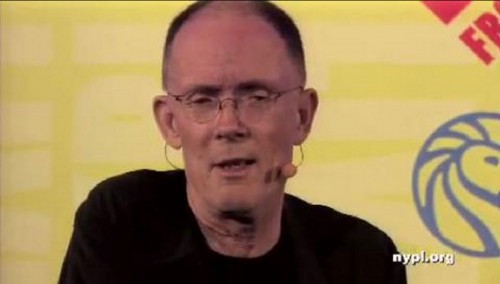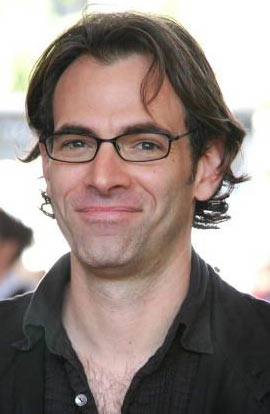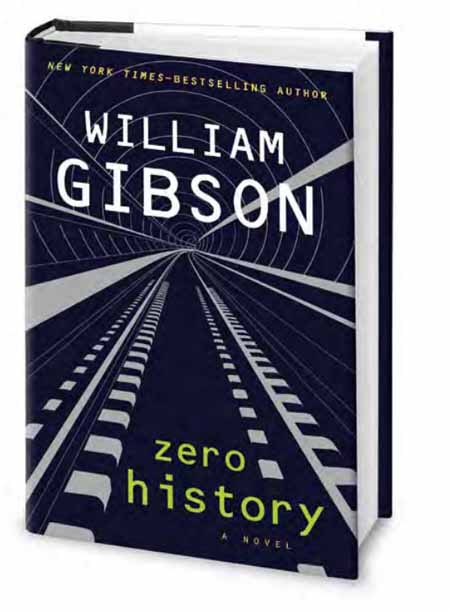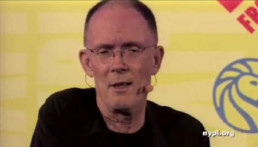THE GONE HAPTICS: William Gibson reads first chapter of his new novel The Peripheral

They didn’t think Flynn’s brother Burton had PTSD but that sometimes the gone haptics would glitch him, they said it was like phantom limb, ghosts of the tattoos he had worn in the war, put there to tell him when to run, when to be still, when to do the bad-ass dance, which direction, what range, so they allowed him some disability for that, and he lived in the trailer by the creek. An alcoholic uncle had lived there before, a veteran of some other war, their father’s older brother.
There's a relatively recent video out there with William Gibson at the New York Public Library, reading the first chapter (entitled The Gone Haptics) of his upcoming novel The Peripheral, and what you just hopefully read in the blockquote is the first sentence. Or the first few, depending on how exact the transcript is. The Gone Haptics also confuses me, bringing me back to wasp nets, military implants and post-war trailer reality oozing Agrippa and that's a good sort of confusion, something very similar to the feeling when I first read Neuromancer when I was thirteen. Go figure.
Inside, the trailer was the color of Vaseline, LEDs buried in it, bedded in Walmart amber.
This video comes from IO9 and if you want more, hop on to the NYPL event page where you have an hour-long video of the whole event (with downloadable audio, video and transcript links) that's going to give you some great insight on Gibson's life and also some teasers on The Peripheral - two timelines shifting in the book, one being cca thirty years from now, the other terribly far ahead, consequently very hard to write? As I said, watch the whole thing.
cunningham után natali rendezheti a neurománcot
 Igen, köszönöm, ne kérdezzétek meg többször, hogy hallottam-e és ne küldjétek át a linkeket se, hallottam, megkaptam, azért van a Google Alerts, hogy realtime kapjam a híreket azokról a kulcsszavakról, amik tényleg érdekelnek, beleértve a Neurománcot, a fehérorosz mezőgazdaságimunkás cosplay bukkakét és Warren Ellis heti három új mailcímét is. A Dose új számába megírtam két napja a cikket erről, de füstölök tőle, hogy úgy jöttök a hírrel, hogy már csak a hullócsillag hiányzik a fejetek mögül, úgyhogy inkább ide is.
Igen, köszönöm, ne kérdezzétek meg többször, hogy hallottam-e és ne küldjétek át a linkeket se, hallottam, megkaptam, azért van a Google Alerts, hogy realtime kapjam a híreket azokról a kulcsszavakról, amik tényleg érdekelnek, beleértve a Neurománcot, a fehérorosz mezőgazdaságimunkás cosplay bukkakét és Warren Ellis heti három új mailcímét is. A Dose új számába megírtam két napja a cikket erről, de füstölök tőle, hogy úgy jöttök a hírrel, hogy már csak a hullócsillag hiányzik a fejetek mögül, úgyhogy inkább ide is.
Sorban az ötödik rendezőjét kapja meg a Neurománc projekt, az elmúlt huszonöt (huszonhat) év legjelentősebb sci-fi regényéből tervezett moziadaptáció húsz éve húzódik, gyakorlatilag már geciszagúbb Reichstag, mint a PC-s játékipar legnagyobb égése, a Duke Nukem 3D. 1990 körül Chuck Russell (The Mask, Nightmare on Elm Street 3, The Scorpion King) vitte volna vászonra, nem vitte és szerencse, hogy a neten terjedő, általa szignózott szövegkönyvek egyike sem igazi, mert igazán sok vér folyna Pierre szeméből meg az enyémből is, ha azzal kéne zárni a gépi tudatosság és metafizika határait feszegető filmet, hogy "szeretni és szeretve lenni minden", igaz, amikor Mario Salieri 1994-ben pornóváltozatot csinál a Drakulából, akkor is valami ilyesmivel zárja. Snitt, Robert Longo jön a képbe 1995 környékén és ki is kerül, ahogyan kiírja magát a pánglobális filmművészet összes könyvéből a Johnny Mnemonickal (baszottul utálok ragozni magyarul, el kéne törni ezt a nyelvet), amit az általam több éve nem triplecheckelt sztori szerint az összes európai filmmagazin 25 százalék alá értékelt és én vagyok a bolygón az egyetlen ember, akinek ez a film még mindig tetszik. (A japán változata hosszabb meg érthetőbb, alább a majdnem tíz percnyi extra részlet az amerikai változathoz képest.)
Chris Cunningham az egyetlen rendező, aki jót tud tenni ezzel a könyvvel, mondja maga Gibson, aztán hiába várjuk, nem készül el 1999/2000 környékére a film, egyes források szerint nem sikerül rendesen együttműködni, mások szerint maga Cunningham dobja vissza a felkérést hónapokkal később, hogy mégsem elég jó hozzá. Aki látta az Aphex Twin-, Björk-, Leftfield- és Squarepusher-munkákat, az ebben kételkedik, a production hell azonban szépen ki van kövezve a jószándékkal, több évre eltűnik a film, főként, hogy a Wachowski testvérek összedobják a Mátrixot a popkultúra tányérszélére száradt kétmichelincsillagos cafatokból. Snitt. 2007, a Torque-rendező Joseph Kahn lesz a film rendezője, a főszereplő meg Christian Haydensen, aki meg következő nap is szeretne egyenes gerinccel tükörbe nézni és nem feketét hányni, az dzsihádot indít az internet ellen, nem csoda, hogy az IMDB-ről Haydensen lekerül a bejelentést követő egy hónapon belül, aztán bejelentik, hogy lesz Tron 3D, amiben van cyberpunk sok meg motor még több, Kahn meg egyébként is csak metroszexuális bárokban, lánylucskosító sörtés férfiakban meg motorokban tud gondolkodni, úgyhogy őt is kispadra rakják. (Lentebb az általa rendezett George Michael Freek-klip, a Coilhouse csapata ezzel próbálta meg ellensúlyozni a geekek fröcsögő utálatát, félig-meddig sikeresen.)
Így kerül ötödik esélyesként a képbe Vincenzo Natali, akin őszintén megdöbbenhetünk, mert eddig jóként cyberpunk/hard SF körökben jól ismert filmeket (Cypher, Cube, Splice) gyártott, nem is akármilyeneket, ráadásul még kanadai is, mint a cybertér pápája, azt kottyantja el, 2011-2012 körül már lehet valami a filmből. Dőljünk hátra. Húsz évet vártunk, várhatunk még többet is. Többet a quietearth.us cikkéből, katt.
william gibson's new book "zero history" arrives in september

ZERO HISTORY, William Gibson's tenth novel arrives on the 7th of September, as advertised in the Putnam Fall 2010 catalogue. As a matter of fact, happy 62th birthday. (via zerohistory blog)
Whatever you do, because you are an artist, will bring you to the next thing of your own. . . .
When she sang for The Curfew, Hollis Henry's face was known worldwide. She still runs into people who remember the poster. Unfortunately, in the post-crash economy, cult memorabilia doesn't pay the rent, and right now she's a journalist in need of a job. The last person she wants to work for is Hubertus Bigend, twisted genius of global marketing; but there's no way to tell an entity like Bigend that you want nothing more to do with him. That simply brings you more firmly to his attention.
Milgrim is clean, drug-free for the frst time in a decade. It took eight months in a clinic in Basel. Fifteen complete changes of his blood. Bigend paid for all that. Milgrim's idiomatic Russian is superb, and he notices things. Meanwhile no one notices Milgrim. That makes him worth every penny, though it cost Bigend more than his cartel-grade custom-armored truck.
The culture of the military has trickled down to the street--Bigend knows that, and he'll fnd a way to take a cut. What surprises him though is that someone else seems to be on top of that situation in a way that Bigend associates only with himself. Bigend loves staring into the abyss of the global market; he's just not used to it staring back.
